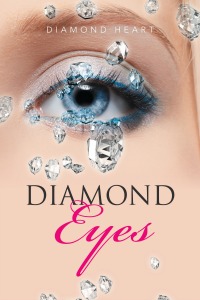Title: Diamond Eyes
Author: Diamond Heart
Publisher: AuthorHouseUK
ISBN: 978-1-5246-0380-9
Pages: 115
Genre: Poetry
Reviewed by: J.W. Bankston
Pacific Book Review
The companion themes of love and loss quickly emerge on the pages of “Diamond Eyes” the new book of verse by the similarly named Diamond Heart. Dedicated to the “memory of a son who loved poetry,” the book offers a dramatic entrance to the author’s deepest thoughts and perhaps a glimpse of her soul.
If loss and love disappeared, poems might still endure. Yet these surviving relics would be fewer in number and far less compelling. Throughout the book, Diamond Heart explores Kübler-Ross’ stages of grief, including anger and eventual acceptance. Employing simple words and structures, the poet still conveys complex emotions, as in “Sleep,” where she writes: “Sleeping peacefully /Until mornings first light/ Dreaming dreams in dreams.” Similarly, in “My Heart” she laments, “the sun says hello to the moon twice a day/ but you not once.”
The simplicity and structure of the poems within “Diamond Eyes” recalls Edna St. Vincent Millay. The bohemian feminist poet of the 1920s Greenwich Village, New York gained fame with works like, “What lips my lips have kissed, and where, and why:” “Under my head till morning; but the rain/ is full of ghosts tonight, that tap and sigh.” Like Millay, Diamond Heart frequently avoids commas at the end of lines. Her idiosyncratic spellings also bring to mind another resident of Millay’s Greenwich Village –– E. E. Cummings, as with this excerpt from “anyone lived in a pretty how town:” “someones married their everyones/laughed their cryings and did their dance/(sleep wake hope and then) they/ said their nevers they slept their dream.”
I’m not going to criticize unconventional syntax or spelling when it serves the poem. My dilemma is that I’m unable to determine if the regular substitution of “your” for “you’re” or “its” for “it’s” reflects the author’s intent. The elimination of apostrophes may satisfy the invisible God of meter, but it also reminds me of the petty tyranny of auto-correct –– the mechanical insistence that I really meant to write “it’s.” Even now I can hear the Friends episode where Ross critiques Rachel’s 18 page letter (front and back) while explaining the distinctions of “it” and “it’s.’ Yet this is a minor quibble. “Diamond Eyes” arc is powerful and ultimately satisfying.
Volumes of poetry should be sipped, enjoyed over the course of days or weeks. For poetry fans and anyone who has endured the loss of loves, “Diamond Eyes” is a steaming cup of tea on a late fall afternoon.



Follow Us